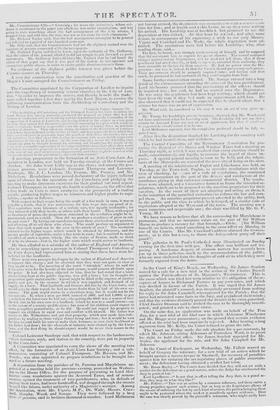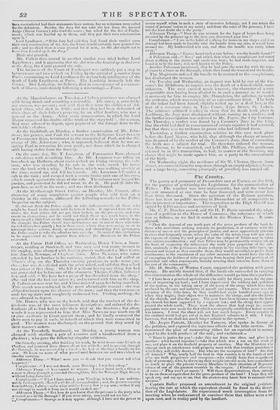In the Court of King's Bench, on Wednesday, Sir James
Scarlett moved for a rule for a new trial in the action of Sir Charles Burrell against the Parish-officers of St. 'Margaret's, Westminster. This is the cause which was tried last term relative to the obligation of the oc- cupiers of houses in Richmond Terrace to pay poor-rates, and which was decided in favour of the Parish. It was urged that Sir James Scarlett, the plaintiff's counsel, was irregularly prevented from making his reply to Sir John Campbell, who appeared for the Parish ; that the latter bed misstated some facts to the Jury, and prejudiced their minds ; and that the evidence distinctly proved the district to be extra-parochial. Chief Justice Denman said he wished the case to be thoroughly investi- gated; and granted a rule to show cause. On the same day, an application was made on behalf of the True Sun, for a new trial of the libel case in which Alderman Winchester and Mr. Briggs were prosecutors ; on the ground that certain evidence offered at the trial had been improperly rejeeted. After hearing a long argument from Mr. Kelly, the Court refused to grant the rule.
The Court on Friday made the rule absolute for a quo warrant°, by which Mr. Johnson, sitting Alderman of Portsoken Ward, is to prove his right to hold that office. Sir James Scarlett appeared for Mr. Scales, the applicant for the rule, and Sir John Campbell for Mr. Johnson.
In the Court of Exchequer, on Wednesday, Mr. Follett moved on behalf of Gregory the informer, for a new trial of an action which he brought against a tavern-keeper in Shadwell, for recovery of penalties against him for violating the act regulating places of public entertain- ment ; the defendant having obtained a verdict last term.
Mr. Baron Bayley—" The Courts have decided that they will not set aside a verdict for the defendant on a penal statute, unless the Judge has misdirected the Jury in point of law." Lord Lyndhurst—" Is.not that in effect telling the Jury that, in a penal ac- tion, they may do what they like?" Mr. Follett—" This was an action by a common informer, and there exists a strong prejudice against such actions ; but as lung as the Legislature allows of the means of enforcing the law by aria kind of actions, the parties bringing them ought to be F tweeted where the vettLet is manifestly against evidence. Here the 'case was clearly proved by the plaintiff's witnesses, who might easily have
Ikea contradicted had their statements been untrue, but no witnesses were called for the defendant. Besides, the Jury did nut take the law from the learned Judge (Baron (;urney) who tried the cause ; but asked for the Act of Parlia- ment; which was handed up to them, and they put their own construction upon It." ford Lyndhurst---" If the Jury had said they had found their verdict upon their own most' uction of the Act, the Court would certainly have granted the Me; and we think there is some ground for it now, as Me Act ought not to Aare teen handed np to Me Jury."
Rule nisi granted. Mr. vniktt then moved in another similar case tried before Lord Lyndhurst ; and it appearing that the Act was also handed up in that case AO Mr Jury, the Court granted the rule. The business of the Court of l xehequer was suddenly put a stop to between one and two o'cloek on Friday, by the arrival of a courier from Paris, announcing to Lord Lyndhurst the melancholy intelligence of the death of Lady Lyndhurst, at Paris. Ilk Lordship instantly left the Cont. I ler Ladyship, we believe, died in consequenee of a severeat- tack of illness, innnediately following a miscarriage.—?roles.



















 Previous page
Previous page